
Journal of Slavic Linguistics
Scope & Guideline
Bridging Theory and Practice in Slavic Linguistics
Introduction
Aims and Scopes
- Morphological and Syntactic Analysis:
The journal consistently publishes studies that delve into the morphological structures and syntactic frameworks of Slavic languages, analyzing phenomena such as allomorphy, verb-prefix orders, and nominal functional categories. - Cross-Linguistic Comparisons:
There is a strong emphasis on comparative studies across Slavic languages as well as between Slavic and non-Slavic languages, facilitating a broader understanding of linguistic universals and specificities. - Language Evolution and Historical Linguistics:
Research investigating the diachronic aspects of Slavic languages, including the evolution of grammatical structures and the historical development of language features, is a core focus. - Interface Phenomena:
The journal often explores the interfaces between syntax, semantics, and phonology, examining how these domains interact within Slavic languages. - Language Contact and Sociolinguistics:
Contributions that address sociolinguistic aspects, including language loyalty, nationalism, and language contact situations, reflect the journal's commitment to understanding the social dimensions of Slavic languages.
Trending and Emerging
- Experimental and Corpus-Based Studies:
There is a significant increase in research utilizing experimental methods and corpus analyses, reflecting a trend towards empirical validation of linguistic theories and phenomena. - Theoretical Approaches to Syntax and Semantics:
Recent publications show a strong inclination towards advanced theoretical frameworks in syntax and semantics, including discussions around control, binding, and the structure of complex sentences. - Morphosyntactic Variation and Change:
Emerging themes include the analysis of morphosyntactic variation and change, particularly in the context of language contact and bilingualism, which are gaining traction in the field. - Prosodic and Phonological Studies:
An uptick in research focusing on prosody and phonology, particularly in relation to Slavic languages' vowel systems and stress patterns, indicates a growing interest in the phonetic aspects of language. - Language and Emotion:
Explorations of how language encodes psychological states and emotions are increasingly prominent, reflecting a broader interdisciplinary engagement with cognitive science and linguistics.
Declining or Waning
- Descriptive Grammar Studies:
There seems to be a reduction in purely descriptive grammatical studies focusing on individual Slavic languages, with a shift towards more theoretical and comparative analyses. - Traditional Dialectology:
Research centered on traditional dialectological aspects is less frequently represented, possibly indicating a shift towards more modern linguistic approaches and methodologies. - Sociolinguistic Case Studies:
Although sociolinguistics remains a theme, specific case studies focusing on localized language use and variation appear to be less common, suggesting a move towards broader or theoretical discussions.
Similar Journals
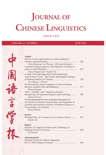
JOURNAL OF CHINESE LINGUISTICS
Advancing the Frontiers of Chinese LinguisticsJOURNAL OF CHINESE LINGUISTICS, published by the JOURNAL CHINESE LINGUISTICS, is a prominent periodical that serves as a vital resource for researchers and scholars in the fields of linguistics and Chinese studies. With its ISSN 0091-3723, this journal has been contributing to the academic community since 1996 and continues to publish innovative research until 2024. Although it is classified in the third quartile (Q3) for both Arts and Humanities and Linguistics categories, its focus on Chinese linguistics positions it uniquely within this specialized domain. The journal is committed to advancing the understanding of Chinese language structures, usage, and context, encouraging interdisciplinary dialogue among linguists and language researchers. While currently not labeled as open access, the journal remains accessible to institutions and scholars worldwide, creating an invaluable platform for disseminating knowledge. As such, it plays a critical role in promoting linguistic diversity and cultural awareness within the academic landscape.

Jezikoslovlje
Exploring the Frontiers of LinguisticsJezikoslovlje, published by the Josip Juraj Strossmayer University, Faculty of Philosophy in Croatia, is an essential publication in the field of Linguistics and Language Studies. Launched in 2008 and extending its contributions to the academic community through 2024, this journal addresses a spectrum of linguistic research, facilitating scholarly dialogue around both theoretical and applied aspects of language. With a current Scopus ranking placing it in the 54th percentile in the Arts and Humanities and the 50th percentile in Social Sciences, Jezikoslovlje serves as a vital resource for researchers and students looking to engage with contemporary linguistic issues. Although it operates under a traditional access model, its indexed presence and rigorous peer-review process ensure that published works maintain a high scholarly standard, inviting contributions that advance understanding in this dynamic discipline. The journal's commitment to fostering knowledge in linguistics makes it a significant platform for academics in Croatia and beyond.

Taiwan Journal of Linguistics
Advancing Linguistic Insights from Taiwan and BeyondTaiwan Journal of Linguistics, published by CRANE PUBL CO, is a prominent Open Access journal dedicated to the field of linguistics since its inception in 2003. With its ISSN 1729-4649 and E-ISSN 1994-2559, this journal serves as a vital platform for the dissemination of significant research and scholarly discussions from Taiwan and beyond. The journal particularly focuses on advancing knowledge in linguistic theory, language acquisition, phonetics, and sociolinguistics, catering to a diverse academic audience including researchers, professionals, and students. Although it currently holds a Q4 ranking in the Linguistics and Language category, the journal's commitment to quality and accessibility positions it as an emerging resource for those engaged in language studies. Currently ranked #584 in Arts and Humanities and #668 in Social Sciences, it provides critical insights and fosters scholarly exchanges that enhance understanding within the field. The journal's open access model ensures the broadest reach for its published articles, facilitating the global sharing of linguistic research. For more information, visit the journal’s website to explore its latest publications and submission guidelines.

Lingue e Linguaggio
Cultivating a Rich Discourse in Language and LinguisticsLingue e Linguaggio, published by SOC ED IL MULINO, is a distinguished academic journal in the field of Linguistics and Language, hailing from Bologna, Italy. With an esteemed Q2 ranking in its category as of 2023, this journal is recognized for its contributions to both the arts and humanities as well as social sciences, achieving notable positions within Scopus rankings. It serves as a vital platform for researchers, practitioners, and students interested in exploring various linguistic phenomena, language dynamics, and theoretical frameworks. Although it operates under a traditional subscription model rather than open access, its comprehensive array of studies and publications provides significant insights and fosters academic discourse. With a publication period extending from 2002 to 2024, Lingue e Linguaggio continues to be a key resource for advancing the understanding of language in contemporary contexts.
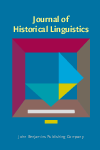
Journal of Historical Linguistics
Decoding the Past Through LanguageJournal of Historical Linguistics, published by JOHN BENJAMINS PUBLISHING CO, is an esteemed peer-reviewed journal that has carved a niche in the intricate field of linguistics and language. With its ISSN 2210-2116 and E-ISSN 2210-2124, the journal has made significant contributions since its inception in 2011, continuing its impactful discourse until 2024. Located in the Netherlands, the journal showcases a commitment to advancing our understanding of language evolution, change, and historical linguistics, providing invaluable insights for researchers, professionals, and students alike. As demonstrated by its commendable rankings—placing it in the Q3 quartile for linguistics and language with a Scopus rank of #275 out of 1088—this journal stands as a critical resource for those invested in the empirical and theoretical aspects of language history. Its accessibility enhances its reach, allowing for a wider distribution of knowledge in this vital scholarly area.
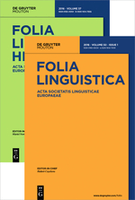
FOLIA LINGUISTICA
Elevating Understanding of Language Structures and UsageFOLIA LINGUISTICA, published by WALTER DE GRUYTER GMBH, is a premier scholarly journal dedicated to the field of linguistics. Established in 1967, the journal has consistently provided a platform for innovative research and scholarly discourse in language and linguistics, contributing significantly to the academic community's understanding of language structures, usage, and cognitive processes. With its classification in the top quartile (Q1) of linguistics and language in 2023, FOLIA LINGUISTICA holds a respectable rank (#282/1088) within the Arts and Humanities category and an admirable percentile rank of 74th, ensuring its position at the forefront of linguistic scholarship. Researchers and academics from around the globe can access a wealth of knowledge and cutting-edge research findings through this esteemed publication, which is vital for anyone looking to engage with the latest advancements in linguistics. Located in Berlin, Germany, FOLIA LINGUISTICA encompasses all aspects of language research, making it an indispensable resource for researchers, professionals, and students alike seeking to deepen their understanding of language and its complexities.

SKASE Journal of Theoretical Linguistics
Pioneering New Perspectives in Theoretical LinguisticsSKASE Journal of Theoretical Linguistics, published by the SLOVAK ASSOCIATION STUDY ENGLISH-SKASE, is a distinguished Open Access journal that expands the horizons of linguistic research and theoretical frameworks. With its ISSN N/A and E-ISSN 1336-782X, the journal has established itself as a pivotal resource for scholars in the field, achieving a commendable Q2 ranking in Linguistics and Language as of 2023. The journal, which has been in continuous publication since 2017, actively publishes innovative research studies, reviews, and theoretical discussions, easing access to groundbreaking work for academics and practitioners alike. Based in Slovakia, it connects a rich heritage of linguistic scholarship and is indexed in Scopus, ranking alongside its peers in both Arts and Humanities and Social Sciences categories. The SKASE Journal of Theoretical Linguistics is crucial for anyone interested in the evolving landscapes of linguistics, serving as an invaluable platform for disseminating knowledge and fostering collaboration amongst researchers worldwide.
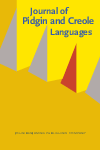
JOURNAL OF PIDGIN AND CREOLE LANGUAGES
Advancing Understanding of Pidgins and CreolesJOURNAL OF PIDGIN AND CREOLE LANGUAGES, published by John Benjamins Publishing Co, is a leading international journal dedicated to the study of pidgin and creole languages, offering a unique platform for interdisciplinary research within the fields of linguistics and language studies. With an impressive impact factor reflected in its 2023 Scopus rankings—placing it in the Q2 category for both Linguistics and Language—this journal has established itself as an essential resource for academics and practitioners alike. Covering a broad temporal scope from 1986 to 2024, it promotes innovative research that advances the understanding of language evolution, socio-linguistics, and cultural dynamics. The journal’s focus on both theoretical and practical perspectives makes it particularly valuable for researchers, professionals, and students interested in the complexities of language and identity. Although it does not currently offer Open Access, its commitment to quality scholarship ensures that each issue presents cutting-edge research and critical insights into the world of pidgins and creoles.
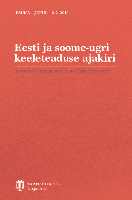
Eesti ja Soome-Ugri Keeleteaduse Ajakiri-Journal of Estonian and Finno-Ugric Linguistics
Advancing the Understanding of Finno-Ugric LinguisticsEesti ja Soome-Ugri Keeleteaduse Ajakiri - Journal of Estonian and Finno-Ugric Linguistics is a premier academic journal published by UNIV TARTU PRESS, dedicated to advancing the field of linguistics with a particular focus on the Estonian and Finno-Ugric languages. Since its inception, the journal has embraced an Open Access publishing model, allowing researchers and enthusiasts to freely explore its groundbreaking studies and findings since 2013. With an Impact Factor that places it in the Q3 quartile of leading journals within the linguistic domain, it serves as a vital platform for the dissemination of new research and theoretical advancements. Ranked 410th out of 1088 journals in the Arts and Humanities category for Language and Linguistics, it reflects a robust commitment to quality scholarship that appeals to academics, professionals, and students alike. Operating from Tartu, Estonia, the journal aims to foster greater understanding and appreciation of the Estonian language within the broader context of Finno-Ugric studies, making it an essential resource for anyone interested in these unique linguistic cultures.

Journal of Portuguese Linguistics
Unlocking the Richness of Portuguese Language StudiesThe Journal of Portuguese Linguistics is an esteemed peer-reviewed academic journal published by UBIQUITY PRESS LTD, dedicated to the exploration of the rich complexities of the Portuguese language and its various linguistic dimensions. With an ISSN of 1645-4537 and an E-ISSN of 2397-5563, this open-access journal has been disseminating valuable research since 2002, ensuring that knowledge is accessible to all scholars, professionals, and students interested in Linguistics. Based in Portugal, it features a distinct focus on the linguistics pertinent to the Portuguese language, facilitating discussions that span theoretical and applied interests. The journal holds a respectable Q3 quartile rank in the field of Linguistics and Language, reflecting its growing significance and contribution to academia, as evidenced by Scopus rankings that place it in the 71st and 68th percentiles in Arts and Humanities as well as Social Sciences. Researchers and practitioners alike will find Journal of Portuguese Linguistics to be an indispensable resource for fostering discourse and innovation in the study of language.